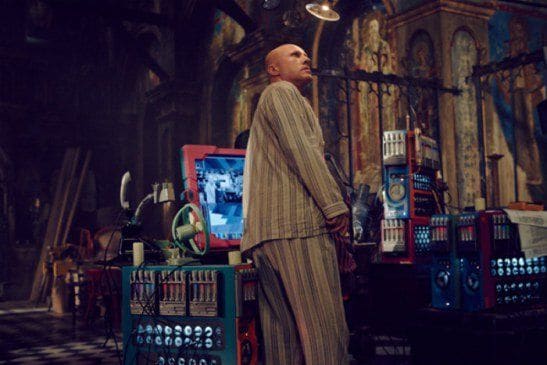Eye For Film >> Movies >> The Zero Theorem (2013) Film Review
The Zero Theorem
Reviewed by: Anton Bitel

We have been here before. If Terry Gilliam's greatest film Brazil (1985) dealt with an ordinary man's search for identity, love and dreams in a shabbily oppressive, Kafkaesque dystopia, then his latest, The Zero Theorem, treads much the same ground, while updating it to our weird, wired world.
Our everyman is Qohen Leth (Christoph Waltz), an individual who has grown so universalised - or is it schizophrenic? Or just arrogant? - that he refers to himself in an all-inclusive first-person plural. Leth, you see, is also us: a plugged-in, personality-free drone who spends half his time working on endless, meaningless tasks, and the other half waiting for a call that he hopes will be the answer to all his prayers and the fulfilment of all his desires. It is significant that Leth's predicament - a crisis part existential, past spiritual - plays out mostly within the confines of a converted church; and it is hardly a coincidence that his peculiar forename, whose spelling and pronunciation are expressly highlighted, sounds just like 'koan', the word for a Zen exercise practised to provoke great doubt and subsequent insight. For while The Zero Theorem might seem on the surface to be a goofily absurdist SF, it is also concerned with issues of faith and (e-)fascism, ontology and eschatology.

While there are hints that joyless, misanthropic Leth once led a healthier, more integrated life, he has since become a hollowed-out shell of a man, stripped of personality (and hair), held together only by anxieties, and living only to work. An expert in crunching "esoteric numbers that have a life of their own" on his steampunk mainframe, Leth secures permission from Management (Matt Damon, in a hilariously chameleonic embodiment of corporate leadership) to conduct all his business from home, on the condition that Leth concentrate on proving the 'Zero Theorem' - a Sisyphean task that enslaves his mind and saps his spirit. Meanwhile, Leth struggles to work out how much of his evolving relationship with sex worker Bainsley (Mélanie Thierry), conducted largely in the virtual world, is actually real - and the presence of Management's teenaged son Bob (Lucas Hedges) slowly reawakens Leth's own relish for life.
The Zero Theorem is a messy mélange of broad pratfalls, challenged idealism, dark satire, and expansive, indeed cosmic allegory - but it also cannot escape being seen as a kind of Brazil vers. 2.0, as though Gilliam has, much like his romantic antihero, become trapped in the loop of his own fantasy. Of course, no one is more entitled to appropriate the imagery and ideas of Gilliam's Brazil than Gilliam himself - but the fact remains that The Zero Theorem, despite occasional flashes of eccentric brilliance, feels mostly like a somewhat subpar Gilliam rip-off. Meanwhile, Richard Ayoade's The Double, which by a peculiar scheduling fluke screened for press at the London Film Festival immediately after The Zero Theorem, seems - with its drab bureaucracies, its retro-Fifties veneer and its prominent ducts - so much more like the real thing. Still, illusion and its desperate maintenance are, after all, Gilliam's key themes - as well as his film's extraordinarily bittersweet endpoint.
Reviewed on: 17 Feb 2014
















